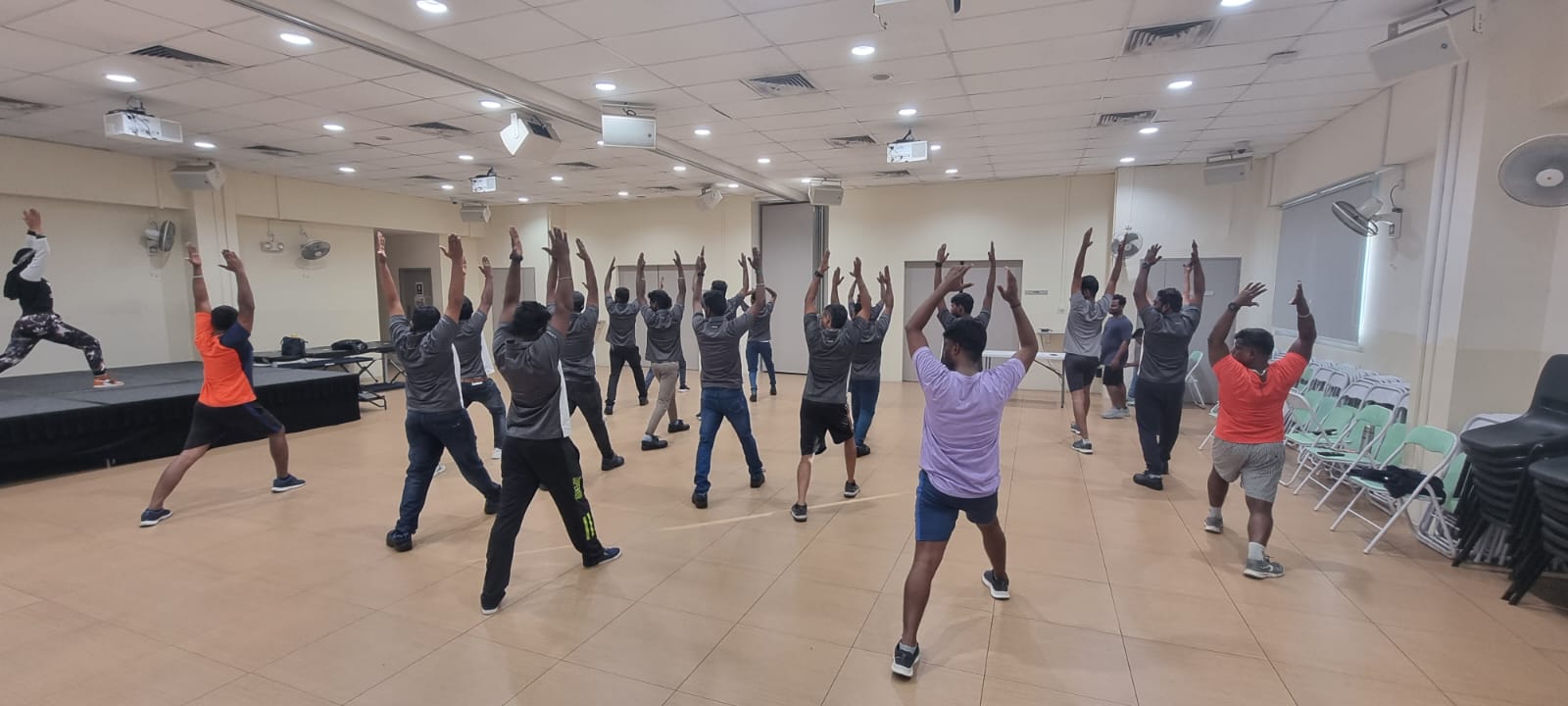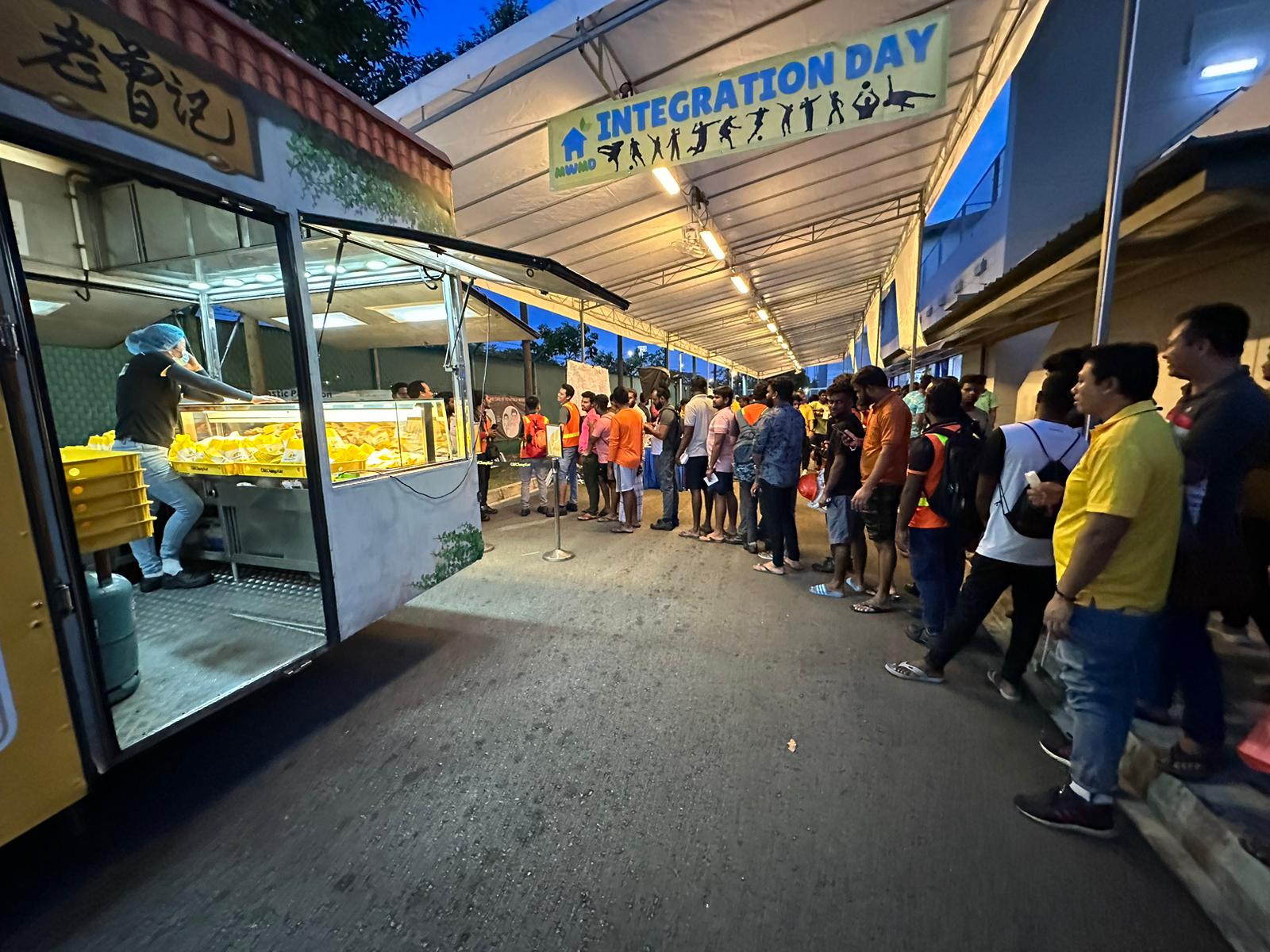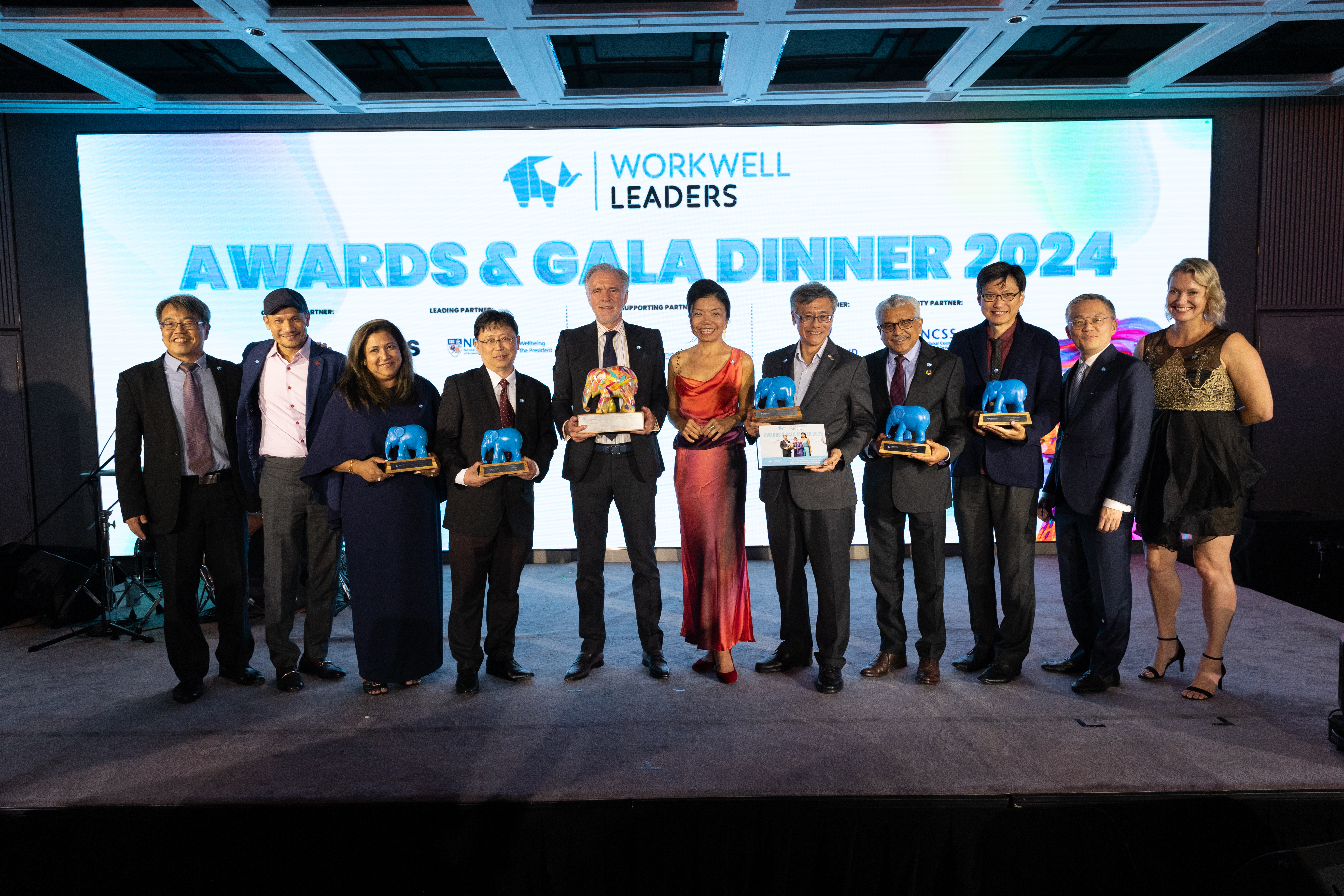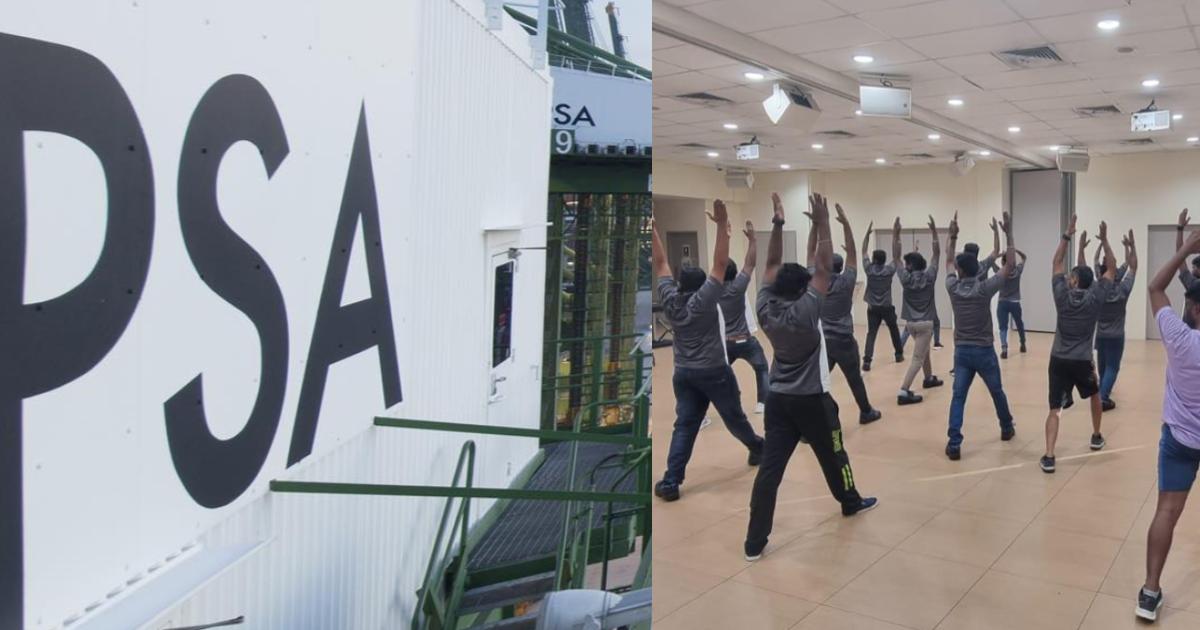The Covid-19 pandemic was a turning point for Cheang Chee Kit and his team.
They had to face the daunting task of looking out for the welfare of 3,000 migrant workers across two dormitories in Pulau Brani and Pasir Panjang through the various lockdowns and vaccination drives.
Cheang, Head of Health, Safety and Security (Southeast Asia) at PSA, understood the gravity of the situation. Since migrant workers are separated from their families, they are more vulnerable to the mental stresses of living under lockdown.
“The pandemic in 2020 taught us that we really need to take care of [the migrant workers]. It put the whole migrant worker community into very sharp focus”, Cheang told Mothership in an interview.
Indeed, a study by the National Institute of Health in 2021 found “a higher number of mental health symptoms amongst participants undergoing complete restrictions", such as those in prolonged in-dormitory or in-room quarantines. The study also emphasised the need to improve the living environment and workplace conditions for migrant workers.
Cheang and his team therefore set out to bolster existing measures within the company to support the mental and physical wellbeing of the organisation as a whole.
These measures earned the company the Wellbeing Innovation Award at the 2024 WorkWell Leaders Awards on Mar. 14.
Who is PSA?
PSA handles one of the world's largest container ports and transhipment hubs here in Singapore. The work involves 3,000 migrant workers, including both PSA employees and those from various service providers.
Instead of having migrant workers stay in a commercial dorm, PSA operates its own dormitories to house the workers.
Cheang told us that he prefers to call the migrant workers his "residents" instead. "I use the word 'residents' because we don't want to really say that they are workers, they stay with us in the dorms and they are the residents of our dormitories," he told us.
PSA has a dedicated Migrant Workers Management team that takes care of its dormitory residents. This Migrant Workers Management team works together with the Health, Safety and Security team headed by Cheang to roll out initiatives and programs that aim at bolstering overall worker wellbeing and safety in the dormitories.
"For us, being safe is being free from physical harm, and free from psychological harm," Cheang told us.
A data-driven approach
Cheang and his team were very much on the ground when it came to dealing with the pandemic. When it came to the vaccines, for instance, his team led by example and were the first to receive the jabs in the dormitories. This was because they understood that many of the workers would have had doubts and insecurities about the safety of the vaccines.
"The first person [to receive the jab] cannot be the resident, the first person must be from the management team. So that really demonstrates that we walk the talk," Cheang told us.
Following the pandemic, Cheang and his team were also keen on hearing directly from the workers about how they felt.
"I would say we always wanted to hear from them, but I guess we were concerned in the pandemic situation about how well did we do when we were reacting to many of the things that happened from the vaccination, and if there is a pent up kind of thing that we didn't realise," Cheang told us.
In 2022, they rolled out a survey distributed to migrant workers in the company to gather feedback.
The survey was disseminated in four languages to accommodate the linguistically diverse migrant worker group.
The survey was designed in partnership with a clinical psychologist, and questions were carefully designed and phrased as they tackled several sensitive topics. This included issues like self-harm.
"To be honest, we even pondered at the initial stage whether should we have that question about whether you have thought about self-harm. But we decided that if [being safe] is about being free from physical harm and psychological harm, we should have that, and make sure that it is there in their own native language, and craft it in a really safe way," Cheang told us.
The survey participation rate was close to 100 per cent. PSA therefore had a sizeable sample size from which to extract a few key insights.
They were able to review the survey responses systematically, to see if there were trends in responses from those in different age groups, work rosters and dormitories.
One of the common responses from workers was a desire for improvements to existing para-counselling services.
Para-counselling services
Para-counsellors were present throughout the company even before the survey was rolled out, but the survey revealed that there was more that could be done to reduce barriers to these counselling sessions.
While they previously had only one para-counsellor taking care of the migrant workers, PSA decided to increase this to two para-counsellors to manage both dormitories after the survey.
PSA also made it easier for workers to meet with their para-counsellors. Previously, in order to meet with a para-counsellor, one had to dial a hotline and then make an appointment online. After the survey, PSA decided to remove these extra steps and make the process easier by implementing an open-door policy.
Thought and care is put into the selection of staff for the para-counselling roles. Factors such as their personality, demeanour and approachability are taken into consideration.
Migrant workers, for instance, are free to meet with para-counsellors at any time by simply walking into their offices in between shifts. This change allowed para-counsellors to appear as regular fixtures in the workers’ lives, and enabled them to develop a strong bond with the residents.
"One of the [para-counsellors] is so seasoned that people talk to him even beyond the work hours. He's very approachable," Cheang told us.
Aside from para-counsellors, Cheang shared that PSA implements what they call a “care-tree” network to support worker wellbeing.
This consists of ambassadors who help provide peer support in the organisation. Ambassadors are chosen from the various teams at PSA, as well as from each of the dormitory rooms.
These ambassadors receive basic training in providing peer support from the company. They learn to listen, as well as to provide a safe environment for fellow residents and colleagues.
The ambassadors pay close attention to the concerns and feelings of their peers, and help relay feedback to management where necessary.
PSA also sees the designation of ambassadors as a way of developing key leadership skills for employees and residents.
Recreational activities
Following the survey, PSA decided to organise more regular recreational activities for its residents and employees as well.
For instance, monthly workout sessions are organised for the migrant workers:
 via PSA Singapore
via PSA Singapore
An integration day was also held in August 2023, in line with National Day, for residents from both dormitories to come together and mingle over food and activities:
 Photo via PSA Singapore.
Photo via PSA Singapore.
WorkWell Leaders Awards
PSA Singapore received the Wellbeing Innovation Award at the 2024 WorkWell Leaders Awards and Gala that was held on Mar. 14.
The award recognises the organisation for having developed a unique idea or programme to address wellbeing and mental health challenges for employees.
The award falls under the "Lead Well" category, which recognises organisation-wide strategies and actions. The other category, "Be Well", recognises leadership.
The awards ceremony, held at Conrad Singapore Orchard, was organised by WorkWell Leaders (WWL), a Singapore-based registered charity that focuses on workplace wellbeing and mental health.
According to WorkWell, judges for the awards included senior leaders from corporates as well as international and local experts in the field of organisational wellbeing and mental health.
In a pre-recorded video address, President Tharman urged corporate leaders to "make your company a role model, a beacon of a culture of empathy, a culture which provides proactive support to those with different shades of anxiety or depression. Make it an enjoyable place for everyone to work.”
 via WorkWell Leaders
via WorkWell Leaders
WorkWell Leaders also announced a new national benchmark that assesses organisational efforts to improve mental wellbeing in the workplace.
“Whilst the WorkWell Leaders Awards winners are the vanguard of the urgent cultural shift needed in the workplace, the benchmark will establish the progress of institutional change that we are making collectively to help boards, CEOs and businesses chart their own strategic roadmaps for more resilient and happier employees and work communities for sustainable growth," said Anthea Ong, Founder and Chairperson of WorkWell Leaders.
Ong revealed in a LinkedIn post that the benchmark has been in the works since 2021, and will be established later this year. The post also noted that WorkWell Leaders convened a working group comprising "local and global experts" as well as "relevant stakeholders" from the corporate and government sectors to co-create the benchmark.
Otis wins two awards
Other award winners at the event included Otis International Asia Pacific, which took home both the Healthy Workplace Culture Award and the Overall Wellbeing Organisation of the Year Award.
A spokesperson for Otis told us about some of the ways the company has created a supportive and healthy workplace environment.
One such measure is an annual mental health risk assessment, administered by third party partners to ensure the anonymity of respondents.
Workers and their family members also have free, 24/7 access to professional counselling services.
Another measure includes what Otis calls "Mental Health First Aiders". These are select employees trained to recognise and respond to signs of distress. They are also given courses in "empathy mapping", a process that helps identify thoughts and feelings, as well as in building emotional resilience.
Otis has also promoted a "speak up" culture in the workplace, aiming to reduce employees' hesitation to voice out concerns and feedback.
Careful implementation
Cheang told us that PSA's survey was "a tool that we thought addresses our blind spots, and we just wanted to be guided by data with a genuine care for workers."
Following the success of the first survey, PSA plans to continue polling its employees, including migrant workers, once every two years.
When asked what advice he would give to organisations looking to improve workplace wellbeing, Cheang emphasised the importance of implementing insights gathered from data with care.
While data can provide a structured way of listening to worker concerns, it can also be cold and impersonal if not treated with sensitivity and adequate concern.
"Data can be harsh and cold, but the implementation [should be] done with care and concern", he said.
Top Photo via PSA Singapore
If you like what you read, follow us on Facebook, Instagram, Twitter and Telegram to get the latest updates.



